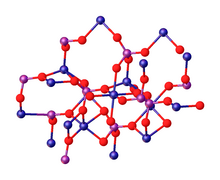Chemistry:Trimagnesium phosphate
From HandWiki

| |

| |

| |
| Names | |
|---|---|
| IUPAC name
Trimagnesium diphosphate
| |
| Other names
magnesium phosphate, phosphoric acid, magnesium salt (2:3), tertiary magnesium phosphate, trimagnesium phosphate
| |
| Identifiers | |
3D model (JSmol)
|
|
| ChemSpider | |
| EC Number |
|
| 15662 | |
PubChem CID
|
|
| UNII | |
| |
| |
| Properties | |
| Mg3O8P2 | |
| Molar mass | 262.855 g·mol−1 |
| Appearance | White crystalline powder |
| Melting point | 1,184 °C (2,163 °F; 1,457 K) |
| Insoluble | |
Solubility product (Ksp)
|
1.04×10−24[1] |
| Solubility | Soluble in salt solution |
| −167·10−6 cm3/mol (+4 H2O) | |
| Hazards | |
| NFPA 704 (fire diamond) | |
| Flash point | N/A |
Except where otherwise noted, data are given for materials in their standard state (at 25 °C [77 °F], 100 kPa). | |
| Infobox references | |
Trimagnesium phosphate describes inorganic compounds with formula Mg3(PO4)2.xH2O. They are magnesium acid salts of phosphoric acid, with varying amounts of water of crystallization: x = 0, 5, 8, 22.[2]
The octahydrate forms upon reaction of stoichiometric quantities of monomagnesium phosphate (tetrahydrate) with magnesium hydroxide.
- Mg(H2PO4)2•4H2O + 2 Mg(OH)2 → Mg3(PO4)2•8H2O
The octahydrate is found in nature as the mineral bobierrite.[3]
The anhydrous compound is obtained by heating the hydrates to 400 °C. It is isostructural with cobalt(II) phosphate. The metal ions occupy both octahedral (six-coordinate) and pentacoordinate sites in a 1:2 ratio.[4]
Safety
Magnesium phosphate tribasic is listed on the FDA's generally recognized as safe, or GRAS, list of substances.[5]
See also
References
- ↑ John Rumble (June 18, 2018) (in English). CRC Handbook of Chemistry and Physics (99 ed.). CRC Press. pp. 5–188. ISBN 978-1138561632.
- ↑ Klaus Schrödter; Gerhard Bettermann; Thomas Staffel; Friedrich Wahl; Thomas Klein; Thomas Hofmann (2008). "Phosphoric Acid and Phosphates". Ullmann's Encyclopedia of Industrial Chemistry. Weinheim: Wiley-VCH. doi:10.1002/14356007.a19_465.pub3. ISBN 978-3527306732.
- ↑ "magnesium phosphate - Compound Summary". https://pubchem.ncbi.nlm.nih.gov/summary/summary.cgi?cid=24439&loc=ec_rcs#top. Retrieved 29 May 2012.
- ↑ Nord, A. G.; Stefanidis, T. (1983). "Structure of cobalt(II) phosphate Structure Refinements of Co3(PO4)2. A Note on the Reliability of Powder Diffraction Studies". Acta Chemica Scandinavica A 37: 715–p721. doi:10.3891/acta.chem.scand.37a-0715.
- ↑ "TRIMAGNESIUM PHOSPHATE". http://toxnet.nlm.nih.gov/cgi-bin/sis/search/r?dbs+hsdb:@term+@rn+@rel+7757-87-1. Retrieved 29 May 2012.
 |


